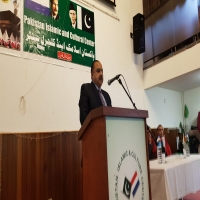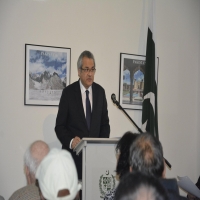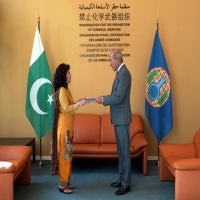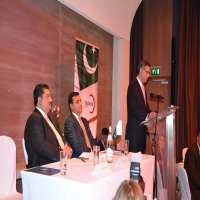Kashmir Black Day – October 27th 1947
Message by Ambassador Shujjat Ali Rathore
On this day seventy-three years ago, the Indian forces landed in Srinagar, Kashmir to illegally occupy and subject its people to subjugation and an unending reign of terror and intimidation. The heaven on earth has since been one of the world’s most oppressed and brutalized place. As we near the end of the year 2020 in The Hague, the aura of the city reminds us that hope is inseparable from notions of peace and justice. For the eight million people of Kashmir hope seems forlorn.
The new year of 1949 marked for them the promise of freedom. On 5th January that year, the United Nations Commission for India and Pakistan unanimously, adopted an historic resolution that, among other things, guaranteed the right of self-determination to the people of Jammu and Kashmir. Both Pakistan and India accepted this resolution. It remains binding even as its promise has remained unfulfilled due to Indian obstruction. Recent times have seen the worst kind of repression.By now, the Kashmiri people have endured nearly 15 long months of severe restrictions on the freedom of movement and communication. There was a communication blackout of the valley from the rest of the world. Mobile data services remained suspended for most of the time. Schools and colleges are still poorly attended and shops only open for a few hours each day. Meanwhile, mainstream political leadership is either under arrest or kept incommunicado.
The occupying Indian security forces have made Kashmir a living hell for the Kashmiri people.In blatant violation of international humanitarian law, these forceshave resorted to widespread and indiscriminate use of pellet-firing shotguns in the Kashmir Valley.Between 2016 and end of 2018, more than 1200 innocent civilians have been blinded by this abhorrent tool of terror and repression. The continued “cordon and search operations,” “fake encounters” and “extra-judicial killings” mean that the people of the valley keep suffering under a constant atmosphere of fear and intimidation. Since August 5, 2019hundreds have been arrested under the Public Safety Act (PSA), which allows for detentions of up to two years without trial. Overall, up to 4000 men and boys have been detained since the revocation of Article 370 and 35 A, the articles of Indian Constitution which at least on the face of it, guaranteed autonomy to Kashmir. Most of those detained have beenshifted to jails in far-flung Indian states.
Months of restrictions on movement and communications have resulted in a health crisis.Doctors have lost contact with patients suffering from such conditions as cancer and other potentially fatal chronicdiseases.The crisis is taking its toll on mental health as well. As the clampdown continues, Kashmiri people are experiencing unprecedented cases of Post-Traumatic Stress Disorder (PTSD) with most cases going unreported due to denial of access to professional medical help.
India's claims of “return of normalcy” in IIOJ&K are false and designed to mislead the world community. Independent observers, journalists, even or Indian opposition leaders have not been allowed to visit Occupied Jammu and Kashmir to evaluate and report the situation.
The reports of the Concerned Citizens' Group (CCG) of India,which is headed by former Finance Minister, Yashwant Sinha has highlighted the dire situation in Kashmir and called for lifting of all curbs on all peaceful political activity and fundamental rights to peaceful assembly. It has further asked for release of all Kashmiris who have been taken into so called preventive detention under the Public Safety Act (PSA), as well as for restoring all internet and mobile phone connections in Kashmir. It also asked the government to compensate the Kashmiris for their massive economic losses resulting from the harsh clampdown.
The reports while noting that there was no support to militancy from Pakistan, has issued the dire warning that Indian actions and pronouncements were encouraging extremist elements from within Kashmir due entirely to the desperation of a people under siege. They have been left helpless to face a predatory foe which is motivated by an ideology of hate and inclined to emulate means of repression practiced by the likes of the Nazis which it idolises. A return to that dark era of human history anywhere in the world should be unacceptable, more so here in the Netherlands whose constitution and the consensus of its polity upholds values of freedom, human rights and respect for international legality. We know too well from experience, that silence in the face of obvious cruelty and blatant oppression, only strengthens the perpetrator. It erodes values and norms that are fundamental to a just and humane world order. The reign of terror let loose by India in Kashmir is real, documented and a daily reality that cannot be denied nor rationalised. Let us not allow the fabric of our humanity to be irreparably damaged by not raising our voice against such tyranny. The people of Kashmir look to the international community to demonstrate that its commitments to peace and justice are not symbols to be worn but values to be practiced without selectivity.
*******




